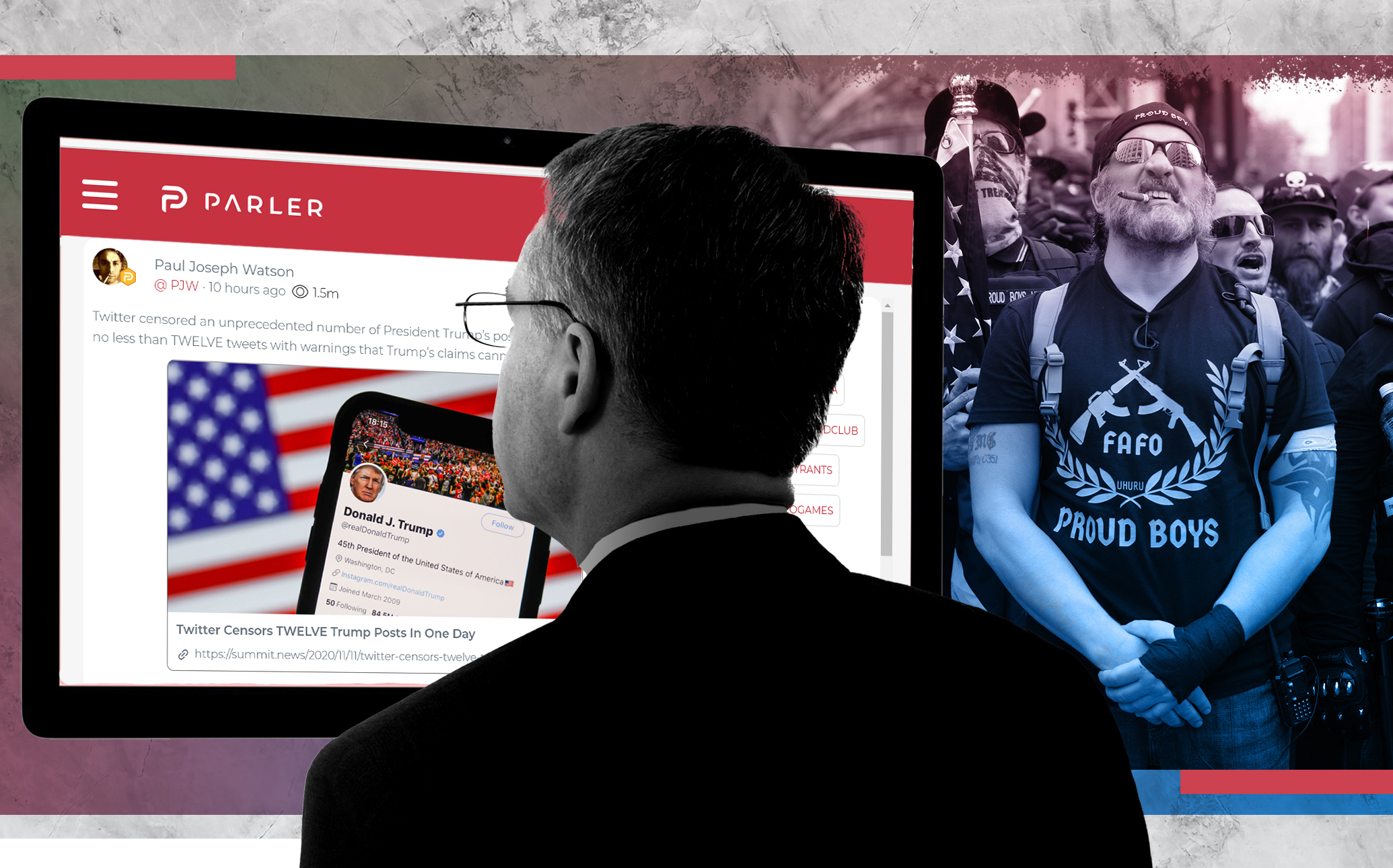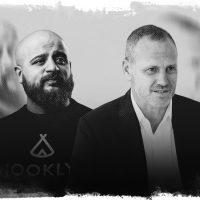 NAR amends code of ethics to ban public hate speech
NAR amends code of ethics to ban public hate speech
Trending
Toxic talk: Agents’ use of social media app Parler stirs concerns
“To know their broker is advertising on a site that has extremists may call into question their judgment”

A few weeks after the election, Steve Martin Smith, a Florida-based RE/MAX broker, used his public Parler account to amplify a post by the far-right extremist group Proud Boys. The all-male, self-described “chauvinist” organization was promoting a march for President Donald Trump in Washington, D.C.
Thousands attended the Dec. 12 event, including anti-Trump protesters, and the demonstration devolved into violence. Four stabbings were reported in connection with the march, and Proud Boys chairman Enrique Tarrio said he participated in the burning of a “Black Lives Matter” banner pulled from a historic Black church.
Why Martin Smith promoted the Proud Boys’ post is unclear. He declined to be interviewed and switched his Parler account to private after being contacted by The Real Deal. Still, the agent, who has a weekly real estate podcast, is among millions of Americans drawn to Parler as the “premier free speech social network.” The platform has become popular among conservatives as an alternative to Twitter, which had begun fact-checking tweets by Trump and other Republican figures.
It’s really hard to say you’re going to use it like any other social media platform. You’re known by the company you keep.
But Martin Smith’s behavior on Parler illustrates a pattern on the app that concerns those who study extremism.
“Do [users like Martin Smith] think that event is legitimate because of Parler’s claim that it’s for conservatives, or do they actually support the Proud Boys?” asked Oren Segal of the Anti-Defamation League’s Center on Extremism.
Segal worries that Parler’s anti-censorship stance could allow extremist users to behave without limitations. For example, Proud Boys has been banned from Twitter since 2018 and from Facebook since June, but the group’s Parler account has more than 270,000 followers.
While that’s a red flag for an expert like Segal, it’s unclear if the real estate agents using Parler are aware of the controversy it has caused or its use by extremists. This could have unintended consequences for their real estate business, experts warn, particularly as the industry begins to crack down on agents’ online conduct. Parler did not respond to a request for comment.
“For some people who reject extremism and hate, to know that their real estate broker is advertising on a site that has extremists may call into question their judgment,” said Segal. “Whether that’s fair or not.”
Here to parley
Parler users who self-identify as agents are affiliated with a range of brokerages, among them Coldwell Banker, Berkshire Hathaway HomeServices, RE/MAX and eXp Realty.
Some say they say were drawn to the app after feeling alienated by mainstream social media like Twitter and Facebook. They’re not alone.
Parler, founded in 2018, became the most-downloaded app in the days after the 2020 presidential election. Many Trump supporters, including actress Kirstie Alley and former UFC fighter Tito Ortiz, recently adopted the platform, beckoning their millions of followers to join them. Other celebrities, including radio host and musician John Tesh, also jumped to Parler.
Phil Pennington, a Realtor based in Gibson, Arizona, created his Parler account after seeing people in his network on Facebook and Instagram make the move.
He said he believed in the idea of a social media platform “that is just a free exchange of community ideas without the comments that seem to be so divisive,” and was hopeful Parler might live up to that.
Other alternative platforms to see user bases grow this year include MeWe and Rumble. Parler functions a lot like Twitter, with 1,000-character posts known as “Parleys” and an “echo” function that amplifies other users’ posts. To see public conversations playing out in the app, users must sign up for an account and select whom to follow.
Read more
 NAR amends code of ethics to ban public hate speech
NAR amends code of ethics to ban public hate speech
 Corcoran axes broker who cursed at woman planting Biden signs
Corcoran axes broker who cursed at woman planting Biden signs
 Incidents at Nooklyn and Core outrage Black agents, staff
Incidents at Nooklyn and Core outrage Black agents, staff
While Parler doesn’t officially brand itself as a platform for conservatives, newcomers to the app in November were welcomed by automated messages from Trump’s re-election campaign and former Rep. Ron Paul’s accounts. The platform is bankrolled by Rebekah Mercer, the daughter of conservative megadonor Robert Mercer.
One of Parler’s selling points is that it doesn’t moderate discussions, but instead relies on users to police each other. An account is deleted when it garners up to 20 “violation points,” which are determined by “a jury of your peers, not employees of Parler.” The app notes that sharing pornography, threats of violence or illegal activites are “contributing factors.”
But Segal is concerned that Parler users will not recognize and report extremist views. Much of the content that brings together extremists and moderates on Parler is centered around Trump and his claim that the election results were illegitimate.
Since the election, Parler has been used by far right activists and Trump supporters to jointly organize and participate in rallies such as the Million MAGA March and, most recently, the Proud Boys’ march. The overlap creates an opportunity for extremists to gain a larger audience among moderates over a shared cause without those users necessarily recognizing the extreme views a group may stand for, Segal explained.
“That’s ultimately the danger, when we don’t even know how to recognize the extremists in our midst,” said Segal. “Parler doesn’t seem to be trying to address that.”
Pennington said he doesn’t feel any more likely to run into extremist content on Parler than other platforms. “The same could be said about Instagram or Facebook,” he said.
Extremism and hate speech on major social media platforms have been rampant for years. But Facebook, YouTube and Twitter have increasingly cracked down on extremism, hate speech and disinformation on their platforms.
Despite his concerns, Segal stressed that Parler is far from becoming like the app Gab or the website Stormfront. Gab gained notoriety in 2018 for being where the shooter at Pittsburgh’s Tree of Life synagogue posted anti-Semitic rants and conspiracy theories before his deadly rampage. And a Klan leader founded Stormfront, which is considered the first major hate site on the internet.
“There are a lot of non-extremist users on Parler right now,” Segal said, adding that “it’s not always cut and dry the motivation behind someone who wants to be there.”
The bottom line
Several agents say they aren’t too concerned about a stigma being associated with the platform.
Christina Winters-Ronk, who owns her own firm in Oregon, joined Parler in February because she liked its commitment to free speech.
If somebody were going to judge me based on having a social media account like Parler, I don’t know that I need them as a client.
“That finger-pointing of hate is absolutely in the wrong direction,” she said, noting that she’s seen more inappropriate behavior and trolling on TikTok than Parler.
Winters-Ronk’s Parler posts are mostly personal, though she occasionally posts videos and photos of properties she’s selling.
For instance, she documented a recent trip she took to Washington, D.C., to participate in the Million MAGA March. In one photo she posted over the summer, she poses in a Trump hat next to a client’s poster for former Democratic presidential candidate Bernie Sanders.
Winters-Ronk said the photo was taken after she and her client realized they were on opposite sides of the political fence. She said posting a photo like that in jest was something she appreciated about Parler.
“Is it a social media platform that I feel like I could post something like that without backlash? Yes, absolutely,” she said. “Do I feel like that would be something censored on another site? Probably.”
“If somebody were going to judge me based on having a social media account like Parler, I don’t know that I need them as a client,” she added.
But while having a Parler account isn’t an endorsement of extremism and hate speech, some homebuyers and sellers may not care to make that distinction.
“It’s really hard to say you’re going to use it like any other social media platform,” said Jennifer White Karp, managing editor of Brick Underground, a consumer-focused real estate site based in New York. “I mean, you’re known by the company you keep.”
“I think one of the big concerns is that people [using Parler] could be more steeped in this ideology and become more indoctrinated, and it could affect how they work,” she added.
The industry’s largest trade group is increasing its effort to police agents’ behavior on social media. Last month, the National Association of Realtors broadened its Code of Ethics to cover not just a Realtor’s conduct while on the job, but in all manner of public life, including social media.
So far, NAR hasn’t fielded any complaints about agents’ conduct on Parler. But a spokesperson for the association noted that “the fact that Parler doesn’t impose such limitations on discriminatory speech doesn’t mean the Code doesn’t.”
Segal said how Parler deals with extremist users in the future will determine whether being associated with the platform will carry more of a stigma.
“In six months, we’ll see just how connected this platform is to extremism,” he said. “Then there won’t be any excuses.”
Correction due to editing error: Stormfront, not Gab, was founded by a Klan leader and is considered the first major hate site on the internet.




